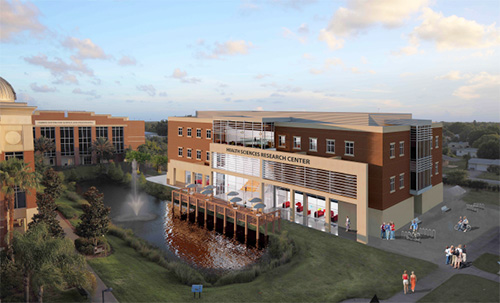Florida Tech to Build $18M Health Sciences Research Center
MELBOURNE, FL – Florida Institute of Technology will break ground in spring 2020 on a 61,000-square-foot Health Sciences Research Center that will help fill the growing demand for jobs in the biomedical and premedical science fields and allow students and faculty to conduct critical research in labs equipped with the latest cutting-edge technologies, from virtual-dissection tables to atomic force microscopes.
The new, $18 million facility will double the size of Florida Tech’s undergraduate biomedical engineering program to 300 full-time, on-campus students; increase the size of the undergraduate premedical program from 150 to 250 students; provide over 20,000 square feet of classroom and training spaces; and allow students access to teaching laboratories that use augmented and virtual reality tools and space for orthopedics, tissue studies and advanced computational simulations.

The Center will be built on a vacant parcel of land on the south campus area known as the Olin Quad. It will be south of the Olin Life Sciences Building and adjacent to the quad’s newest buildings, the Harris Center for Assured Information, which opened in 2009.
The Center will be funded by the sale of Educational Facilities Revenue Bonds.